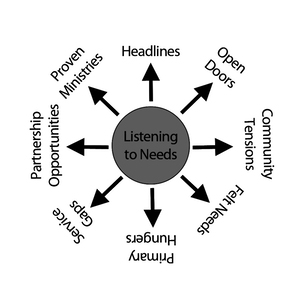What is God's call on the life of your church? What has he uniquely equipped you to accomplish? What doors has he opened in the lives of your neighbors and community?
In answering these questions, you are listening for the voice of God. You are hearing what God is (and has been) saying to your church about its principle mission-a mission he has commissioned you to accomplish, equipped you to accomplish effectively, and opened opportunities for you to accomplish directly.
The three primary avenues through which God speaks to us about mission (the issue explored in this series of articles) involve his Spirit, his people, and the world.
- Through prayer and Scripture, God nudges us towards mission.
- By considering the people he has assembled as a church-who they are, their gifts and abilities, the resources they bring to bear-God points us towards mission.
- And through our circumstances-the community surrounding the church, the times in which it lives, the felt needs of your neighbors-God moves us towards mission.
It is how all this comes together, however, that is most helpful for churches in search of God's calling. We label this the "Mission Matrix." Imagine three "dials" representing the information you derive from listening to God, the Church, and the Community.
 Mission Matrix God
Mission Matrix God
 Mission Matrix Church
Mission Matrix Church
The "church" dial will help you understand the strengths and weaknesses of your congregation. Who has God brought to your church? What are their gifts and skills? What kinds of ministry ignite their passions and commitments? All of this is important information about the church God has formed (see 1 Corinthians 12:11-18 - esp. verses 11 & 18) in your location. As you listen to the church, however, one or two attributes will stand out. You might notice that many of your members are teachers… or that there is a historic tendency to generosity… or that you are blessed with people who are gifted and passionate about worship. You will recognize one or two attributes as great strengths of your church. [In the graphic to the right, I'm imagining that you have a wealth of mature, committed, and deeply spiritual older members. Your greatest "resource" as a church. They could form the core of a mentoring ministry, pouring themselves into younger people as marriage mentors, parenting mentors, or spiritual mentors.]
 Mission Matrix Needs
Mission Matrix Needs
The "needs" dial will help you understand the hungers of and opportunities within your community. What are people talking about? Where are your neighbors hurting? Who's being overlooked? Can you form strategic partnerships with other churches or city services? What ministries to your community are making a kingdom difference? Where are the open doors? Once again, this "listening" will yield a wealth of information about the place God has put you and the neighbors God has given you. You will (no doubt) be overwhelmed with the needs and prospects. But out of this exercise you will identify one or two "prime opportunities" for meaningful ministry. [In the graphic to the left, I'm imagining that you have an opportunity to partner with a neighborhood counseling center, a couple of nearby churches, and a local school to provide parenting training and support.]
As you combine these three "dials" (and the results they highlight), you begin to hone in on your church's God-called mission. In the above examples, for instance, "discipling" headed the list of the fundamental works God has given his church to accomplish. A core group of "mentors" comprise one of the major resources of the congregation. And a series of strategic "partnerships" were available to the church that permitted significant ministry to an area of community need.
Put this all together and you begin to hear God's voice about the church's mission. He may be telling you (through his Spirit, who he has placed in your congregation, and surrounding circumstances) where he wants your church to make a kingdom difference. In this case, the mission of the church very likely involves a focus on discipling and equipping, through the mentoring skills and gifts of members, addressing the felt-need for better parenting/marriage relationships in the community, and partnering with local churches and services to make a wider impact.












Comments
Have thoughts on this article? Leave a comment